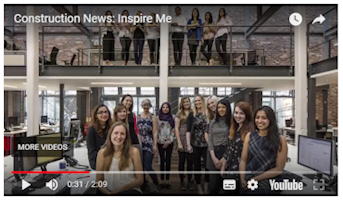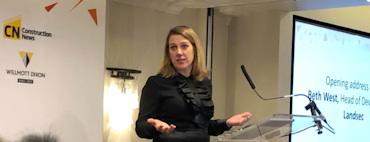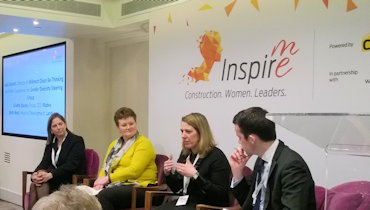Zena writes:
Last Thursday I attended the first Inspire Me workshop.
VGC is proud to be an official supporter of the campaign.
Most of the workshop attendees were women: a refreshing reverse of the normal gender balance at construction events. Everyone had made a tremendous effort to overcome the weather to attend, and there were very few empty places.
Introduction
 Tom Fitzpatrick, Construction News editor, introduced the morning with the Inspire Me video. It’s an excellent video which is well worth watching – and includes a reminder of the research suggesting that diverse companies outperform companies which are less diverse.
Tom Fitzpatrick, Construction News editor, introduced the morning with the Inspire Me video. It’s an excellent video which is well worth watching – and includes a reminder of the research suggesting that diverse companies outperform companies which are less diverse.
Beth West, head of development (London) at Landsec
Beth West spoke about her own career journey.
She talked about the supportive male bosses who had nurtured her own career, and the backing she’d had when she started out in politics and banking. However, when she moved into the transport industry, some male colleagues were resentful and dismissive. A large number of women nodded agreement when Beth talked about the perception women have that we need to choose between being a ‘bitch’ and a ‘doormat’.
Beth remembered tremendous support after she’d had her first child. However, she was sidelined when she came back to work after having her second child. The attitude then was very much: “She’s had two babies so she isn’t going to be interested in working too hard”. Not surprisingly, she left that organisation!

Now she feels the construction industry is changing. There is more collaboration, and behaviour has improved generally, in men and women. While bad behaviours still occur, there are also men, even in mostly male teams, who want to make the industry more collaborative and less aggressive.
Beth discussed her ambition to make sure other women stay in our industry and succeed. Inspire Me is about asking what we need to do to keep women from leaving their careers in construction. She talked about inspirational women whose example led her to feel that she can be herself. She no longer feels that she has to ‘act tough’ to succeed.
The real key is the corporate culture. “A company’s culture is the worst behaviour a CEO will let people get away with”. Setting the tone, identifying and calling out bad behaviour is the job of leadership. It can be exhausting, so women need male allies to do so too. Whenever it isn’t just women seeing and commenting on inappropriate behaviour, but men who dislike it too, things improve dramatically for everyone.
Roundtable discussions

Beth’s address was followed by discussions on the barriers preventing women from seeking and achieving leadership roles in construction. Our table, facilitated by Lucy Alderson of Construction News, was lucky to have a number of highly articulate women from a range of careers.
The discussion included:
- Some men talk over women in meetings, shouting them down. They may also repeat what a woman has said, louder, and then take credit for it.
- We discussed assumptions about parenthood – by women as well as men. It’s very telling that women are often asked how they manage parenthood and careers – but men are not asked the same question.
- We discussed quotas. Some people felt a quota would detract from their need to be hired and promoted solely on merit, but others disagreed. Despite the equality laws, without a quota there have been only isolated pockets of change.
Panel discussion
Beth was joined by Julia Barrett, director of Willmott Dixon Re-Thinking, and Juliette Stacey, CEO of Mabey.
Julia pointed to the skills gap: while companies all want to recruit the best of the best, the pool is getting smaller. It is essential to be more diverse, to open it out and ‘make the pool bigger’. She talked about hard targets Willmott Dixon has set, including that 50% of management trainees must be women. Interestingly, at trainee entry level, they find that perform in interviews better than men. (I wondered how much that might, in fact, be linked to how interview performance is rated.)
Juliette encouraged women in leadership to spread the word that being a leader is ‘OK’. They can then encourage other women: “come and join in”.

I was particularly interested in the panel’s comments about quotas. Juliette pointed out that to make genuine improvements, you need specific targets. People may believe they’re doing well, but having measurable targets holds them to account, and presents a structured way to assess change. Julia suggested that if more women are present because of a quota, culture change will follow, until quotas are no longer needed.
Beth said she used to be opposed to quotas, but has seen that in Scandanavia quotas have inspired a change of culture. Julia added that people think of themselves when they write job descriptions, and recruit in their own image. Quotas may be a way to encourage people to rethink how they recruit, and get more diverse teams generally.
On the subject of mentoring and support, Beth said women should not be afraid to ask for help or support. People are busy, so help may not be immediate, but it’s still worth asking.
Men as allies
There was quite a lot of discussion on the value of male allies – and on encouraging more men to attend events such as this one. Both men and women behave better when the other gender is present!
A number of people agreed with Beth’s initial point: women get tired of calling out inappropriate comments, and we need support from male colleagues who may also feel uncomfortable, but tend not to say so. Julia talked about the focus groups she had run when she started at Willmott Dixon. As many men as women had witnessed behaviour that made them feel uncomfortable. She pointed out that we need to work together to call out these behaviours, adding that it is better done with tact. We need to make it safe to challenge inappropriate behaviour; at the same time, by being tactful, you can encourage allies and bring people with you.
Juliette felt the key is for everyone to be respected. Beth agreed: behaviour that isn’t appropriate needs to be challenged, even if that means dismissing people. She also suggested there may well be a link to wider mental wellbeing. While women tend to leave if the atmosphere is poisonous, men’s need to ‘tough it out’ may lead to poor mental health
By improving respectful behaviour we can make the industry a nicer place for us all to work.
Inspiring
It was a very worthwhile morning, meeting and listening to a number of thoroughly inspiring women. Thanks to Inspire Me partners Construction News and Willmott Dixon, and our fellow supporters
I look forward to seeing the Construction News write-up of all the other discussion points for which there wasn’t time.

More information
There is more information about Inspire Me on its website. We will be attending the next workshops in Manchester and Birmingham, too.
And after an initial meeting on 6 February, VGC will launch our own women’s support group on 8 March, International Women’s Day. Please contact us if you’re interested in finding out more.
